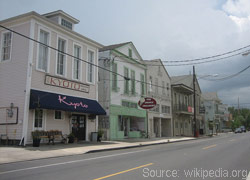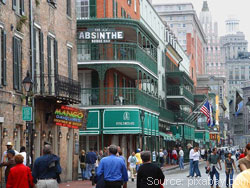 Known as the festival capital of the world, New Orleans is a melting pot of culture, food, and music. The city portrays a melange of cultures and traditions with spicy food, pulsating music and bars that don't have a closing time.
Known as the festival capital of the world, New Orleans is a melting pot of culture, food, and music. The city portrays a melange of cultures and traditions with spicy food, pulsating music and bars that don't have a closing time.
The early European settlers like the French, galvanized the intermingling of cultures - Africans, both slave and free, and American Indians with the Europeans which resulted in a durable culture that gave New Orleans its distinct character.
There is generally a slow pace of life in the city described best by the phrase "New Orleans time". Long late nights and lazy summer afternoons is what life in the city is about. If you have any intentions of moving to this city, you have got to slow down and embrace life here.
Here is the guide that will help you relocate smoothly to New Orleans.
New Orleans Climate
The city is a peninsula forming a crescent-shaped curve around the Mississippi River and Lake Pontchartrain on the north. New Orleans is located in the delta area on the natural levees along the Mississippi River. Mild winters, and hot and humid summers characterize the city's climate.
The waterfronts keep the climate away from the extremes. Rain falls throughout the year with maximum precipitation in the summer and minimum or nonexistent precipitation in October. In the winter, the precipitation is usually due to the passing cold front.
Snowfall is sporadic and occurs rarely during Christmas which is usually a combination of rain, sleet, and snow. Coastal erosion and human interference have made New Orleans more susceptible to hurricanes. Post- Katrina, the United States Army Corps of Engineers have taken massive hurricane protection measures like repairing levees to protect the city from any more flooding.
New Orleans Neighborhoods
The Quarter, commonly called the French Quarter or Vieux Carre, is considered a National Historic Landmark and one of the oldest neighborhoods in the city. The Central Business District is analogous to downtown of many other cities. The neighborhood consists of skyscrapers housing various professional offices, retail, restaurants, clubs, and restored commercial and industrial buildings which have turned into residences. Central City has more of an African American population and plays an important role in the city's brass band and Mardi Gras.
 Audubon, also known as the University District, houses Tulane and Loyola Universities and has the largest park in the city, the Audubon Park. Once a marsh and a fishing town for Uptowners, Broadmoor is an area that has witnessed substantial growth in recent times. Treme is one of the oldest neighborhoods and is known for African American and Creole cultures. The West End is a recreational boating hub also known for its seafood restaurants. The Bywater neighborhood has seen no flooding which has earned it the name "silver by the river". This is the neighborhood where the Society of Saint Anne marching Krewe starts their procession during Mardi Gras.
Audubon, also known as the University District, houses Tulane and Loyola Universities and has the largest park in the city, the Audubon Park. Once a marsh and a fishing town for Uptowners, Broadmoor is an area that has witnessed substantial growth in recent times. Treme is one of the oldest neighborhoods and is known for African American and Creole cultures. The West End is a recreational boating hub also known for its seafood restaurants. The Bywater neighborhood has seen no flooding which has earned it the name "silver by the river". This is the neighborhood where the Society of Saint Anne marching Krewe starts their procession during Mardi Gras.
Living Costs in the City
The city offers an affordable cost of living as compared to other major metros. USA Today rated New Orleans as the number one city for gas savings with an average commute of 13.7 miles each day. Louisiana has been ranked the number one happiest state in the US in a study by the Centers for Disease Control and Prevention in 2009.
Sales tax in New Orleans is 9 percent and it is not levied on food and medications. The city is a shopper's paradise for international shoppers as there is a refund of sales tax for international shoppers at any of the tax-free stores. Whether you want a mansion, boat house, or a cottage in the swamps, the New Orleans housing scene is highly versatile.
Registering Your Car
Upon your arrival in Louisiana after moving to the state permanently, you have a total of 30 days to update your registration and have your vehicle registered in the state before you may be required to pay a penalty.
A Louisiana Driver's License can be obtained at any Louisiana OMV (Office of Motor Vehicles) location. The state requires new Louisiana residents to update their license from their previous state to a Louisiana driver's license by providing proof of insurance and registration of the vehicle in the state of Louisiana. If you fail to update your driver's license you may have to pay a fine.
New Orleans Moving Resources
Don't stress out over packing! There are many moving and storage companies eager to help you with your move to New Orleans, whether you're moving from out of state or from another county in Louisiana. Make sure you get estimates from multiple moving services before you commit to hiring any (at least three estimates). Check back to our guides for tips on how to choose your moving service wisely with important questions to ask, differentiating between types of estimates, and mistakes to avoid. Visit the following pages at Movers.com to get quotes for the following services:
In addition, there are also many storage companies located within the city in case you need a place to store some of your belongings, whether it's for a short amount of time until you get settled in your new home, or for more long-term storage. You can find yourself an Indianapolis storage company to help fulfill your storage needs.
Public Transportation
The bus and street car services are controlled by the New Orleans Regional Transit Authority or NORTA. It has the reputation for being one of the safest systems in the entire nation. The services include three streetcar lines, 32 bus routes, and a special paratransit services for the disabled.
All the RTA buses and streetcars are equipped with devices that facilitate disabled people to board, ride, and get down from the vehicles comfortably. Paratransit service is like a door-to-door service within the Orleans Parish. This service can be obtained by persons whose disability prevents them from utilizing the standard RTA buses and streetcars, or if their destination is outside of the standard routes.
Culture and Contemporary Life
 The culture of New Orleans is unusually diverse and is constantly evolving while assimilating various influences. One of the top ten most visited cities in the United States, it's known for spring break vacations, live music/concerts and bands, antique shops, and vibrant nightlife. New Orleans is synonymous with Mardi Gras – a carnival season which starts on the feast of epiphany and culminates on Fat Tuesday just before the start of Lent.
The culture of New Orleans is unusually diverse and is constantly evolving while assimilating various influences. One of the top ten most visited cities in the United States, it's known for spring break vacations, live music/concerts and bands, antique shops, and vibrant nightlife. New Orleans is synonymous with Mardi Gras – a carnival season which starts on the feast of epiphany and culminates on Fat Tuesday just before the start of Lent.
The city hosts Jazz Fest where different genres of music and artists are featured. The city earned the nickname of Hollywood South following increase in the number of films being filmed and produced. Notable among them include The Pelican Brief, Ray, Runaway Jury, Glory Road, All the King's Men, and The Curious Case of Benjamin Button. The Historic New Orleans Collection contains arts and artifacts that depict the history of the city. New Orleans is not just a concrete jungle and has an urban green space. City Park, New Orleans Botanical Gardens, Audubon Park, Longue Vue House and Gardens are some of the green spaces the city boasts.
The cuisine of the city has assimilated various influences like Creole, French, Italian, Spanish, African, Cajun, Chinese, and Cuban to evolve into what has quintessentially come to be known as Louisiana Creole cuisine. Notable dishes among them are fried oysters, Po'boy, boiled crawfish, gumbo, beignets, and pralines.
Moving to New Orleans
New Orleans is a city which has a festive feel to it and reflects a laid-back attitude. Post-Katrina the city has been rebuilt and has seen novel opportunities in various fields. With a lower cost of living than other major metropolitan areas and numerous job opportunities in various sectors, New Orleans is one of the most sought-after places to relocate.
Moving can be a herculean task and if you have to move with children, it becomes even more difficult. The best strategy would be to involve your children in all aspects of your move by giving them age-appropriate tasks.
Hire a moving company that has had experience working in the city and has good credentials and reviews. Even though moving companies will do all the tasks, from your end you should have a plan and schedule tasks over a timeline without leaving out any details.
New Orleans Relocation Tips
-
Make a checklist of tasks to be done before and after you've moved. Carry a hard copy of these two with you always.
-
It is a good idea to give your foreman not just your phone number but also your alternate contact number, in case you can't be reached on the former.
-
Pack a box with bare necessities like toiletries, toilet paper, flashlight, screw driver, paper plates, cups, a couple of utensils, paper towels and other such items. Ask your foreman to load this box last so that it will be unloaded first at your destination.
-
Unscrew bulbs from the lamps before packing them. Lamp shades need additional protection so it is a good idea to pack them separately.
-
Irreplaceable photos, financial papers, legal documents like wills, passports, family medical records, and valuables (jewelry, stamp and coin collections) should be moved by you.
After loading take a final walkthrough of the house and switch off all of the utilities like electric, gas, and telephone.